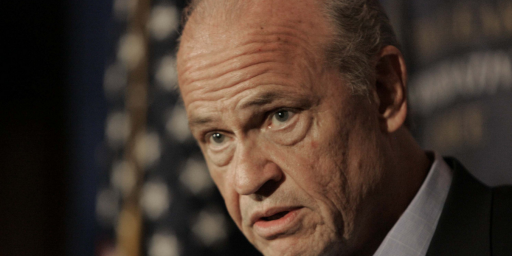Legal Ethics Gone Awry
Adam Liptak reports on the bizarre case of a lawyer who ratted out a then-dead former client in order to free an innocent man from jail and is now facing legal censure.
STAPLES HUGHES, a North Carolina lawyer, was on the witness stand and about to disclose a secret he believed would free an innocent man from prison. But the judge told Mr. Hughes to stop. “If you testify,” Judge Jack A. Thompson said at a hearing last year on the prisoner’s request for a new trial, “I will be compelled to report you to the state bar. Do you understand that?”
But Mr. Hughes continued. Twenty-two years before, he said, a client, now dead, confessed that he had acted alone in committing a double murder for which another man was also serving life. After his own imprisoned client died, Mr. Hughes recalled last week, “it seemed to me at that point ethically permissible and morally imperative that I spill the beans.”
Judge Thompson, of the Cumberland County Superior Court in Fayetteville, did not see it that way, and some experts in legal ethics agree with him. The obligation to keep a client’s secrets is so important, they say, that it survives death and may not be violated even to cure a grave injustice — for example, the imprisonment for 26 years of another man, in Illinois, who was freed just last month.
I understand the importance of attorney-client privilege and respect that it requires making some hard choices that have bad individual outcomes in order to preserve a greater good.
A lawyer’s broad duty to keep clients’ confidences is the bedrock on which the justice system is built, [most legal experts] argue. If clients did not feel free to speak candidly, their lawyers could not represent them effectively. And making exceptions risks eroding the trust between clients and their lawyers in future cases. Experts in legal ethics are quick to point out that the various players in the adversary system have assigned roles and that lawyers generally must tend to a limited one. “Lawyers are not undercover informants,” said Stephen Gillers, who teaches legal ethics at New York University. Indeed, said Steven Lubet, who teaches legal ethics at Northwestern, few clients would confess to their lawyers if they knew the lawyers might some day choose to disclose that information.
That’s fair enough. And, one could argue, society is no worse off since, without the existence of the confidence conferred by privilege, we wouldn’t have had the information to begin with.
But, at a minimum, privilege should die with the client. My understanding is that doctor-patient confidentiality mostly does, as does the bond between reporter and source. Surely, no real harm would come from the same standard holding for attorney-client privilege, at least with respect to these sort of cases.
Via Jonathan Adler who, interestingly, expresses no opinion on the matter.






Well, IANAL and all that, but I was under the impression that while a defendant’s lawyer can do all sorts of things to keep him from being convicted, but flatly lying in court is not permissible. If his client openly confesses to him, isn’t there some sort of need for him to stop being that guy’s lawyer, even if (the lawyer) he doesn’t testify?
legion,
It’s more complicated than that, because a defendant may have committed an the action which underlies the crime, but still not be guilty of the crime. For example, if you kill someone in the heat of passion, you’re not guilty of first degree murder, because you didn’t satisfy the “premeditated” element of the charge.
Additionally, you can defend someone you know is guilty without lying to the court. All you have to do is argue that there is a reasonable doubt, not that the client is not guilty. Additionally, a defense attorney is obligated to plea what his client wants. That said, in some jurisdictions a lawyer might be ethically bound to encourage a client to plea guilty in such circumstances. But a lawyer can’t MAKE the client plea guilty.
Perhaps from a legal standpoint, as well as a logistical one, this makes sense. And perhaps Hughes is correct on the ethics of the thing, as well, I don’t know. these seem a lot of questions attached.
For example, I wonder if the deceased’s family, etc was affected by this revelation. Other than the defendant being defended, what were the ramifications of the revelation? Could all the possibilities… the whole matrix of them… be accounted for properly by a law? Lawmakers, I fear, like to think… unjustifiably… that they can see all ends.
You call this statement what you will, but it appears to me clear that the one thing this case does is make it clear that morality is never as simple as a mere rulebook.
What happen to the idea that it is better to let 10 guilty men go free than keep one innocent in jail? Oh that’s right we are talking about protecting the lawyers and they get to make the rules. So much for justice.
Attorney client privilege does nothing to protect the lawyers – it protects the client.
It seems to me that there’s an exception to most every privilege when imminent harm is involved. I cannot imagine that the privilege is so inviolable that it would serve to protect a dead man and allow an innocent man to be harmed by the injustice of wrongful imprisonment. But I’m not a judge in the deep south, either.
Billy, of course you are right. It protected a dead client so well that it sent an innocent man to jail.
After working with hundreds of lawyers for the past 30 years perhaps I have become cynical but I have come to believe beyond any shadow of a doubt, nothing happens in the legal system that is not for the benefit of the lawyers, they are just very good at making it look like it is to protect the client.
This is a complex issue as attorneys must have solid and completely candid relationships with their clients, but they also have a duty to “justice.” The judge was being too harsh, holding too firm to principles while a man was rotting in jail. The state bar should have been alerted so that they could discuss the matter, but the judge should have celebrated the other man’s freedom and not focused so publicly on the attorney’s actions. Gray area like this shouldn’t be penalized until it is debated and sorted out. The attorney knew the consequences and didn’t put his client at risk since his client was deceased. Tough call, and the attorney made a tough decision.